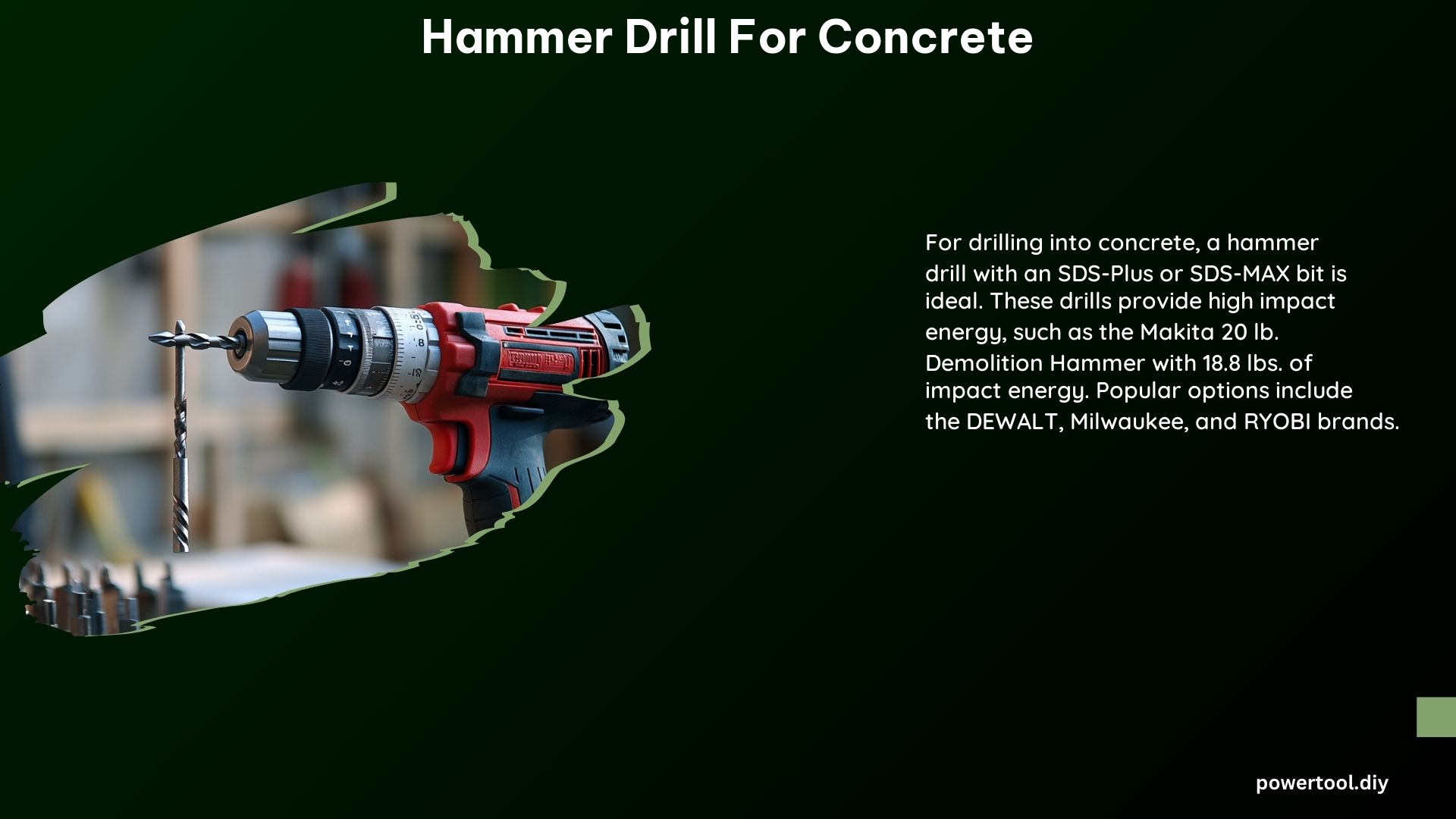Hammer drills are indispensable tools for DIY enthusiasts and professionals alike when it comes to drilling into concrete, brick, and other masonry materials. This comprehensive guide will delve into the key considerations, technical specifications, and recommended options to help you make an informed decision when selecting the perfect hammer drill for your concrete drilling needs.
Minimum Amperage Required for Concrete Drilling
The minimum amperage required for a hammer drill to effectively drill through poured concrete depends on several factors, including the size and type of the drill, as well as the specific characteristics of the concrete being drilled. As a general rule, a higher amperage drill is necessary for larger holes or thicker concrete.
For instance, a 6.5-amp hammer drill like the BLACK+DECKER BEHD201 can handle small to medium-sized holes in concrete, while a more powerful 13-amp rotary hammer drill like the AOBEN Rotary Hammer Drill is better suited for larger holes and thicker concrete. The higher the amperage, the more torque and impact force the drill can generate, making it more efficient at breaking through dense materials.
Adapters for Large Hammer Drill Bits

Hammer drills often require the use of specialized drill bits, such as SDS-MAX or SDS-Plus, to handle the high-impact forces generated during concrete drilling. However, in some cases, you may need to use larger drill bits than your hammer drill’s chuck can accommodate.
Fortunately, adapters are available that can convert the larger SDS-MAX or SDS-Plus bits to fit into drills with smaller chuck sizes. These adapters provide the necessary interface to securely hold the larger bits and transfer the hammer drill’s impact force effectively.
When using adapters, it is crucial to ensure that the adapter is compatible with both the drill and the bit. Mismatched or incompatible components can lead to damage to the tool or the bit, as well as potential safety hazards. Always refer to the manufacturer’s recommendations and specifications to ensure a proper and safe fit.
Proper Configuration for Drilling Concrete
To ensure the optimal performance and safety when using a hammer drill for concrete, it is essential to configure the tool correctly. Here are the key steps to follow:
-
Choose the Right Drill Bit: Select SDS-MAX or SDS-Plus bits specifically designed for concrete drilling. These bits have a unique shank and are engineered to withstand the high-impact forces generated by hammer drills.
-
Select the Correct Drill Mode: Switch the drill to the hammer or impact mode. This mode generates the necessary high-impact forces required to effectively break through concrete.
-
Use Proper Drilling Technique: Hold the drill firmly and maintain steady pressure. Apply gentle to moderate pressure, depending on the drill and bit, to avoid overheating or damaging the tool.
-
Keep the Drill and Bit Cool: Use a water spray or mist to keep the drill bit cool and reduce dust buildup. This helps prevent overheating and extends the life of both the drill and the bit.
Following these steps will ensure that your hammer drill is properly configured and used in a way that maximizes its efficiency and longevity when drilling into concrete.
Technical Specifications to Consider
When selecting a hammer drill for concrete, there are several key technical specifications to consider:
-
Amperage: As mentioned earlier, higher amperage drills are generally more powerful and suitable for larger holes or thicker concrete.
-
Chuck Size: Ensure that the drill’s chuck size is compatible with the desired drill bits, whether they are SDS-MAX, SDS-Plus, or other types.
-
Drill Mode: Look for drills with a dedicated hammer or impact mode to generate the necessary high-impact forces for concrete drilling.
-
Weight and Ergonomics: Consider the weight and ergonomic design of the drill, as you may be using it for extended periods. A comfortable and well-balanced tool can help reduce fatigue and improve productivity.
By carefully evaluating these technical specifications, you can select a hammer drill that is well-suited for your concrete drilling needs, ensuring efficient and safe operation.
Recommended Hammer Drills for Concrete
Here are some popular and highly-rated hammer drills that are well-suited for concrete drilling:
-
AOBEN Rotary Hammer Drill: This 13-amp rotary hammer drill features a 1-1/4 inch SDS-Plus chuck, making it capable of handling larger holes and thicker concrete.
-
BLACK+DECKER Hammer Drill: With a 6.5-amp motor, this hammer drill is a more compact and lightweight option suitable for small to medium-sized concrete drilling tasks.
-
DEWALT DCH133B 20V Max XR Brushless 1″ D-Handle Rotary Hammer Drill: This cordless rotary hammer drill offers the convenience of battery power without sacrificing performance, with a 1-inch SDS-Plus chuck.
When selecting a hammer drill for your concrete drilling needs, be sure to carefully consider the specific requirements of your project, such as the size and depth of the holes, the thickness of the concrete, and the overall power and performance needed to get the job done efficiently and safely.
